
puppy training guide pdf
Welcome to the journey of puppy training! This guide covers essential techniques like positive reinforcement, crate training, and housebreaking, helping you establish a routine and set clear expectations for your new furry friend.
1.1 Importance of Early Puppy Training
Early puppy training is crucial for establishing good behavior, socialization, and preventing unwanted habits. The first few months are a critical period for development, shaping your puppy’s temperament and behavior. Training during this time helps build trust, reduces anxiety, and ensures your puppy grows into a well-adjusted adult dog. Consistency and positive reinforcement lay the foundation for a lifelong bond and a well-behaved companion.
1.2 Key Principles of Puppy Development
Key principles of puppy development include positive reinforcement, clear boundaries, and consistent routines. Socialization is critical during the first 16 weeks, shaping your puppy’s confidence and behavior. Establishing trust through gentle guidance and avoiding punishment fosters emotional stability. Mental and physical stimulation through play and training are essential for healthy growth. These principles create a foundation for a well-adjusted, obedient, and happy adult dog.
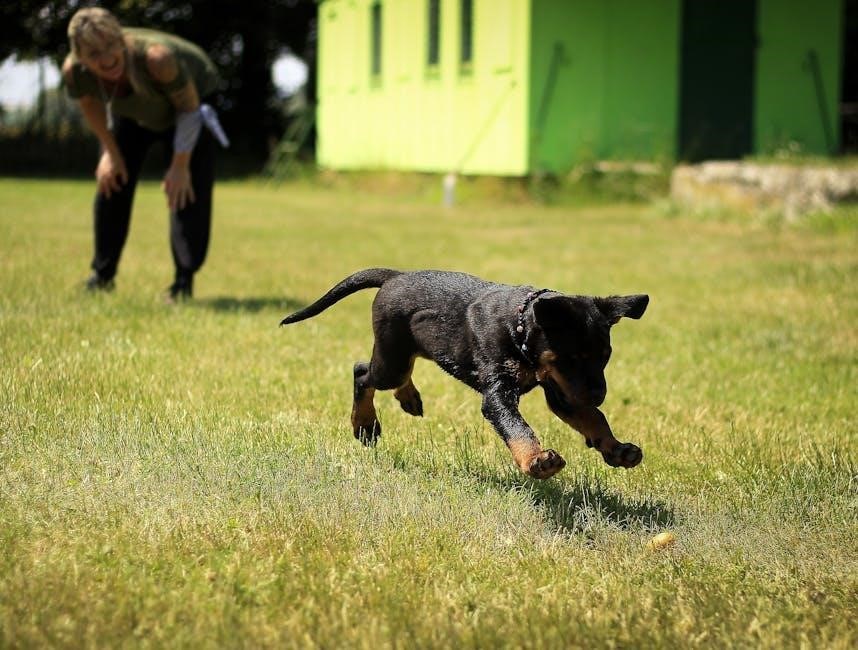
Preparing Your Home for a New Puppy
Prepare your home by removing hazards, securing toxic substances, and setting up essential supplies like crates, bedding, and toys. Create a safe, welcoming environment for your puppy.
2.1 Puppy-Proofing Your Home
Puppy-proofing ensures your home is safe for your new furry friend. Secure toxic substances, electrical cords, and breakables out of reach. Install baby gates to restrict access to dangerous areas and use lockable cabinets for hazardous items. Supervise your puppy at all times and create a safe zone with puppy-friendly toys and bedding. This preparation helps prevent accidents and gives you peace of mind while your puppy explores.
2.2 Essential Supplies for Puppy Training
Stocking up on the right supplies ensures a smooth puppy training experience. A crate, leash, collar, and ID tags are must-haves for safety and routine. Training pads or newspapers help with housebreaking, while interactive toys keep your puppy entertained. High-value treats and a clicker are essential for positive reinforcement. Puppy-safe chew toys and a comfortable bed also support your puppy’s physical and emotional needs during training.
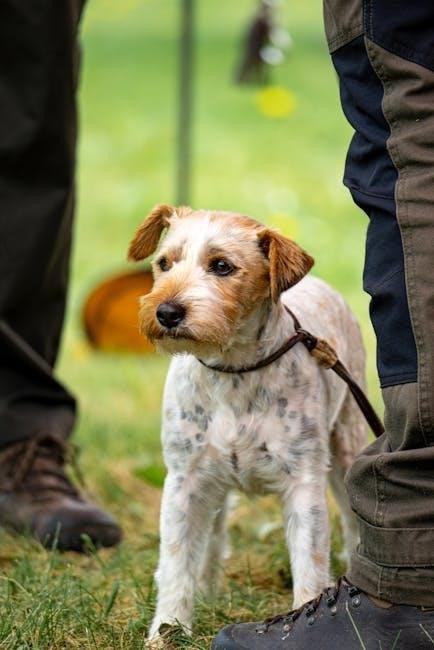
Housebreaking Your Puppy
Housebreaking is a cornerstone of puppy training, requiring consistency, patience, and positive reinforcement. Establishing a routine and using crate training can help your puppy learn quickly and effectively.
3.1 Creating a Puppy Schedule for Potty Training
A structured schedule is key to successful potty training. Plan regular potty breaks after meals, naps, and playtime, using a designated area. Include feeding times and play sessions in your routine. Consistency helps puppies learn faster. Use commands like “go potty” and reward good behavior with treats or praise. Adjust the schedule as your puppy grows and becomes more reliable. This routine builds trust and reduces accidents.
3.2 Common Challenges in Housebreaking
Housebreaking can present several challenges, such as inconsistent schedules, accidents due to impatience, and distractions during potty breaks. Puppies may also struggle with signaling their needs or differentiating between indoor and outdoor areas. Health issues, like urinary infections, can disrupt progress. Staying patient, observant, and adaptable is crucial to overcoming these obstacles and ensuring successful potty training. Consistency and positive reinforcement remain key to addressing these challenges effectively.
Basic Obedience Commands
Mastering basic commands like “Sit,” “Stay,” “Come,” and “Down” lays the foundation for your puppy’s behavior and communication. Consistency and positive reinforcement are key to successful learning.
4.1 Teaching “Sit,” “Stay,” and “Come”
Start with “Sit” by holding a treat above your puppy’s head and moving it backward. As they follow the treat with their nose, their bottom will lower into a sitting position. Once mastered, introduce “Stay” by taking a few steps back while your puppy is sitting. For “Come,” use a consistent recall word and reward your puppy with treats or praise when they respond promptly. Consistency, patience, and positive reinforcement are key to teaching these foundational commands effectively. These basic obedience commands provide a strong foundation for more advanced training and improve communication with your puppy.
4.2 Using Positive Reinforcement Techniques
Positive reinforcement is a powerful method for puppy training, focusing on rewarding desired behaviors with treats, praise, or toys. This approach encourages puppies to repeat good actions by associating them with positive outcomes. Consistency and timing are crucial—reward your puppy immediately after the desired behavior to reinforce the connection. Avoid punishment, as it can create fear and hinder learning. Instead, focus on building trust and confidence through rewarding good behavior, which accelerates the learning process and strengthens your bond with your puppy.
Crate Training Your Puppy
Crate training helps with potty training, reduces separation anxiety, and prevents destructive behavior. It provides a safe, comfortable space for your puppy to relax and feel secure.
5.1 Benefits of Crate Training
Crate training offers numerous benefits, including aiding in housebreaking by preventing accidents, reducing separation anxiety, and minimizing destructive behavior. It provides a safe space for your puppy to relax, promoting a sense of security. Crate training also helps with sleep training and prevents unwanted chewing. By creating a routine, it assists in teaching boundaries and can be a valuable tool for managing your puppy’s behavior effectively.
5.2 Introducing the Crate to Your Puppy
Introducing the crate to your puppy should be a positive experience. Place the crate in a social area and fill it with treats or toys to entice exploration. Start by leaving the door open, allowing your puppy to enter voluntarily. Gradually close the door during calm moments, beginning with short periods. Always supervise and ensure your puppy feels safe. If your puppy shows signs of stress, slow the process to build trust and comfort.
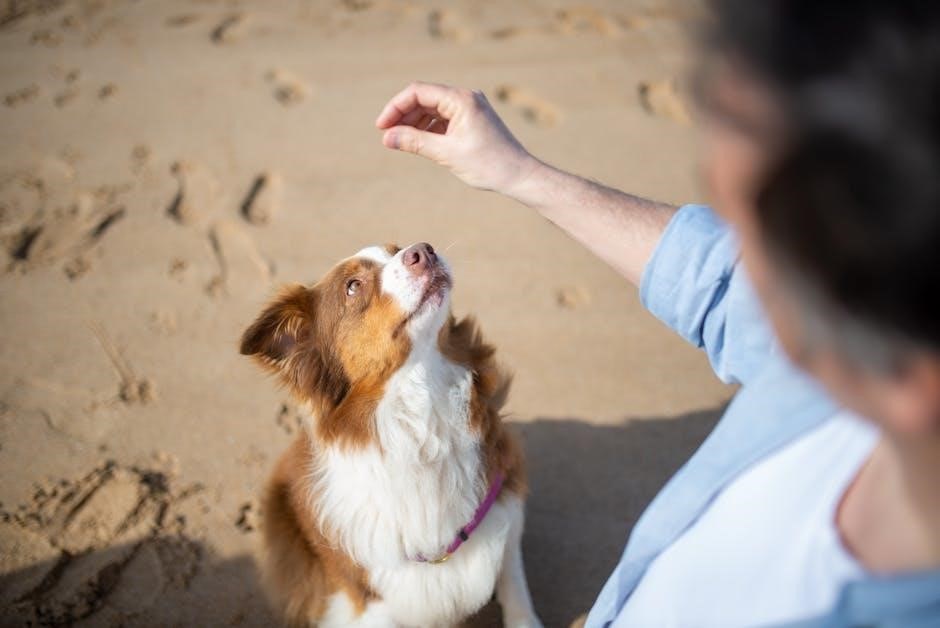
Socialization and Puppy Kindergarten
Socialization exposes puppies to new environments, people, and experiences, shaping their confidence and behavior. Puppy kindergarten provides a structured setting for learning basic manners and social skills, aiding in confidence and reducing anxiety.
6.1 The Critical Socialization Period
The critical socialization period for puppies typically occurs between 8 and 16 weeks of age. During this time, puppies form impressions of their environment, people, and other animals, shaping their temperament and behavior. Positive experiences during this phase are crucial for fostering confidence and reducing future anxiety or aggression. Exposure to diverse stimuli, such as new places, people, and animals, helps puppies develop good social skills and adaptability, laying the foundation for a well-adjusted adult dog.
6.2 Enrolling in Puppy Training Classes
Enrolling your puppy in training classes is a fantastic way to enhance socialization and obedience skills. These classes provide a structured environment where puppies learn basic commands and interact with other dogs, reducing anxiety and aggression. Trained instructors offer guidance on addressing behavioral issues and strengthening the bond between you and your puppy. Classes also serve as a platform for puppies to develop confidence and good manners, ensuring a well-adjusted adult dog.
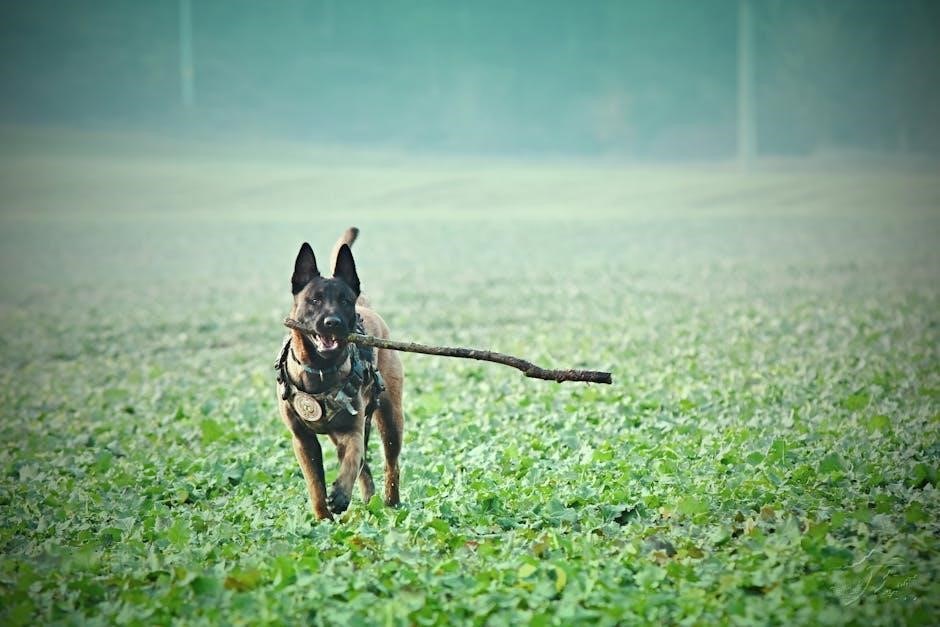
Nutrition and Feeding Guidelines
Proper nutrition is vital for puppy growth. Choose high-quality puppy food tailored to their age and breed, following a consistent feeding schedule to avoid overfeeding.
7.1 Choosing the Right Puppy Food
Choosing the right puppy food is crucial for healthy growth. Opt for high-quality, nutrient-rich options tailored to your puppy’s age, breed, and special dietary needs. Avoid fillers and by-products, ensuring the food is formulated to support growth stages. Consult your veterinarian for recommendations and always read labels carefully to ensure it meets your puppy’s specific requirements.
7.2 Feeding Schedule for Puppies
A consistent feeding schedule is vital for your puppy’s health. Start with 3-4 small meals daily for puppies under 6 months, gradually reducing to 1-2 meals as they mature. Timing should align with potty breaks and playtimes to establish a routine. Ensure meals are spaced evenly, and avoid overfeeding. Adjust portions based on breed, size, and activity level, always following the feeding guidelines provided by your veterinarian or the food manufacturer.
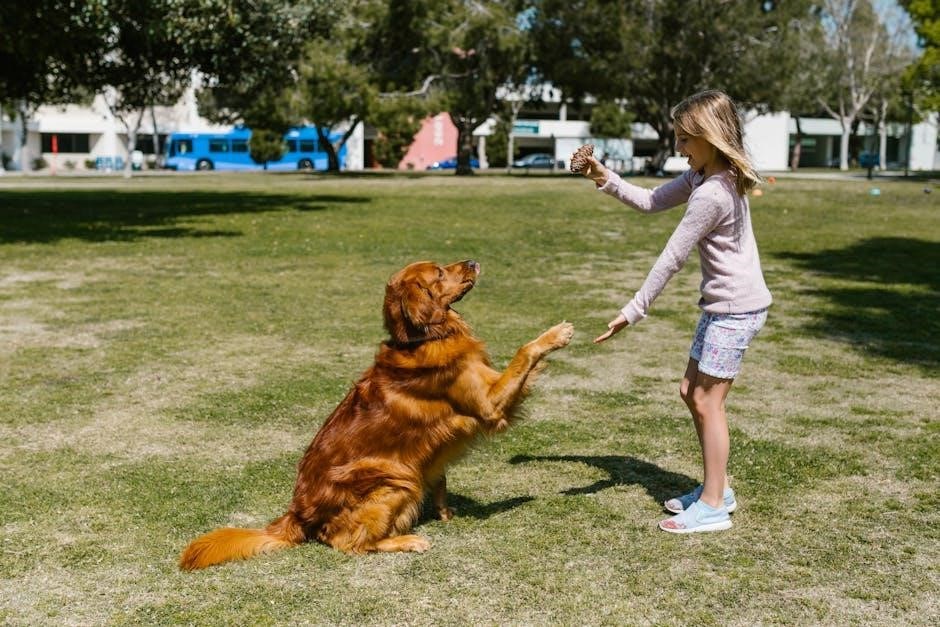
Health and Veterinary Care
Regular veterinary check-ups and vaccinations are crucial for your puppy’s health. Monitor for signs of illness and maintain proper hygiene to prevent infections. Early detection of health issues ensures timely treatment, promoting a long, healthy life for your puppy.
8.1 Vaccination Schedule for Puppies
A proper vaccination schedule is vital for protecting your puppy from life-threatening diseases. Key vaccinations include rabies, distemper, and parvovirus, typically administered at 8, 12, and 16 weeks of age. A booster shot is usually given between 12-16 weeks to ensure immunity. Consult your veterinarian to tailor a schedule based on your puppy’s breed, health, and lifestyle, ensuring they receive the necessary protection during their critical growth phase.
8.2 Recognizing Common Health Issues
Puppies are prone to various health issues, such as parasites, respiratory infections, and hip dysplasia. Watch for symptoms like vomiting, diarrhea, lethargy, or difficulty breathing. Regular check-ups with your vet can help identify these problems early. Monitoring your puppy’s behavior and physical condition is crucial for ensuring their well-being and preventing complications. Early detection and treatment are key to maintaining their health during critical growth stages.
Advanced Training Techniques
Master advanced techniques like leash walking and addressing barking or chewing. These methods build on basic obedience, fostering a well-behaved and responsive puppy using positive reinforcement consistently.
9.1 Training Your Puppy to Walk on a Leash
Teach your puppy to walk calmly on a leash by starting in quiet areas and using positive reinforcement. Avoid pulling by stopping when resistance occurs. Use a harness for better control and reward good behavior with treats or praise. Be patient and consistent, gradually increasing walking distances as your puppy becomes more comfortable and responsive to commands.
9.2 Addressing Barking and Chewing Issues
Puppies bark and chew due to boredom, anxiety, or teething. Redirect barking by commanding “quiet” and rewarding calmness. For chewing, provide durable toys and praise correct choices. Supervise closely and use positive reinforcement to discourage unwanted behaviors. Consistency and patience are key to resolving these common issues, helping your puppy develop better habits and reducing stress for both you and your pet.
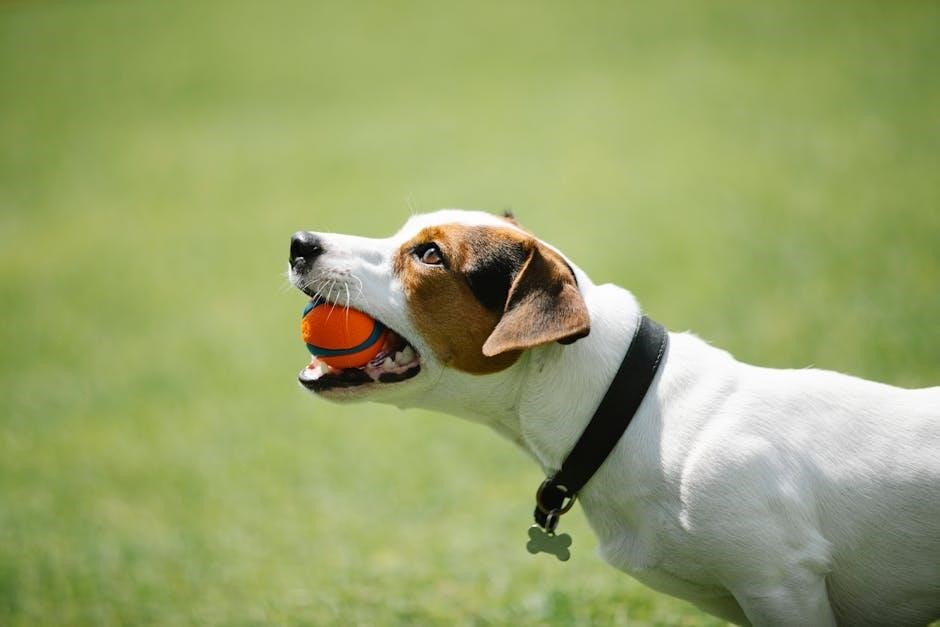
Troubleshooting Common Behavioral Problems
Address common issues like separation anxiety or chewing by redirecting behavior and using positive reinforcement. Consistency and clear boundaries help resolve problems, fostering a well-behaved puppy.
10.1 Managing Separation Anxiety
Separation anxiety is common in puppies, causing stress when left alone. Gradually increase alone time, starting with short periods. Use crate training to provide a safe space and reduce destructive behavior. Leave a TV or radio on for comforting noise. Reward calm behavior upon return. Consistency and positive reinforcement help alleviate anxiety, ensuring your puppy feels secure and develops independence.
10.2 Correcting Jumping and Nipping
To address jumping and nipping, stay calm and consistent. When your puppy jumps, ignore them until they calm down. For nipping, withdraw your hands and offer a toy instead. Use commands like “gentle” to teach soft mouthing. Positive reinforcement, such as treats and praise, rewards good behavior. Be patient, as these habits take time to correct. Redirecting energy and setting boundaries helps your puppy learn proper interaction skills.

The Role of Consistency in Puppy Training
Consistency in puppy training ensures reliable routines and clear communication, fostering trust and a stable environment for effective learning and development.
11.1 Setting Clear Boundaries and Rules
Setting clear boundaries and rules provides structure, helping puppies understand what is expected. Consistency in commands and routines ensures they learn quickly and avoid confusion. Start with simple, positive commands like “sit” and “stay,” and reward good behavior. Boundaries also protect your home and belongings by teaching what is off-limits. Be patient and persistent, as puppies thrive on routine and clear communication.
11.2 Maintaining a Daily Routine
Maintaining a daily routine is crucial for puppy training, as it provides structure and consistency. A predictable schedule for feeding, playtime, training, and rest helps puppies feel secure and aids in housebreaking. Consistency reinforces good habits and ensures your puppy adjusts smoothly to family life. Stick to regular times for meals, potty breaks, and activities, adjusting as your puppy grows to meet their changing needs and energy levels.
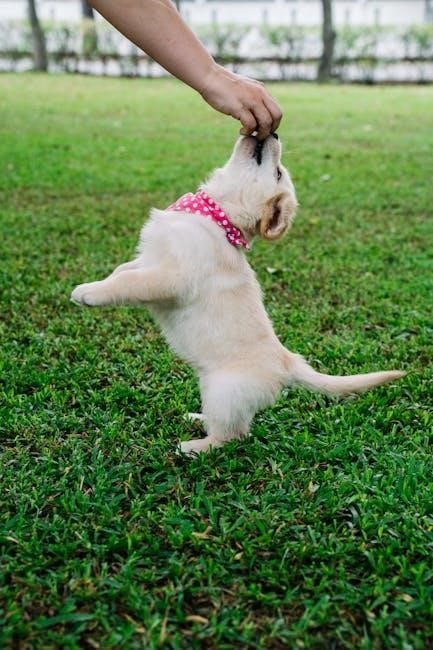
Using a Puppy Training Schedule
A puppy training schedule provides structure, ensuring consistency in potty breaks, feeding, play, and training sessions. It helps prevent behavioral issues and sets clear expectations for growth.
12.1 Sample Daily Schedule for Puppies
A sample daily schedule for puppies includes morning potty breaks, feeding, playtime, and short training sessions. Midday naps and afternoon walks are essential, followed by evening relaxation. Consistency helps with potty training and behavioral development, ensuring a balanced routine for growth and happiness. Adjust the schedule as your puppy grows to meet their evolving needs and energy levels, maintaining a structured yet flexible approach to their daily care.
12.2 Adjusting the Schedule as Your Puppy Grows
As your puppy grows, their needs evolve, requiring adjustments to their daily schedule. Gradually increase playtime and exercise duration, and introduce more complex training. Reduce the frequency of potty breaks and feeding times, aligning with their maturing bladder and digestive system. Ensure ample rest periods to prevent overexertion. Tailor activities to their energy levels and interests, maintaining consistency to provide a sense of security and stability. Regular vet check-ups will guide further adjustments, ensuring a balanced routine that supports their growth into a healthy adult dog.
Positive Reinforcement and Reward Systems
Positive reinforcement is key to effective puppy training. Use treats, praise, and consistency to encourage desired behaviors. Avoid punishment, focusing on rewarding good actions to build trust and confidence.
13.1 Best Rewards for Puppy Training
- Treats: Use small, tasty, and healthy treats like pieces of cooked chicken or puppy-safe snacks to instantly reward good behavior.
- Praise: Verbal affirmation and affectionate gestures reinforce positive actions and strengthen your bond.
- Interactive Toys: Offer toys filled with treats to keep your puppy engaged and motivated during training sessions.
- Life Rewards: Use real-life rewards like playtime or walks to encourage desired behavior in various contexts.
Timing and consistency are crucial for effective reward systems. Use high-value rewards for challenging tasks and phase out treats as your puppy matures.
13.2 Timing and Consistency in Rewarding Behavior
Timing is critical in puppy training; rewards should immediately follow desired behavior to ensure understanding. Consistency ensures your puppy associates actions with rewards. Use the same commands and rewards across all trainers to avoid confusion. Immediate, clear feedback helps puppies learn faster and builds trust; Regular, predictable rewards maintain focus and motivation, making training sessions more effective and enjoyable for your puppy.
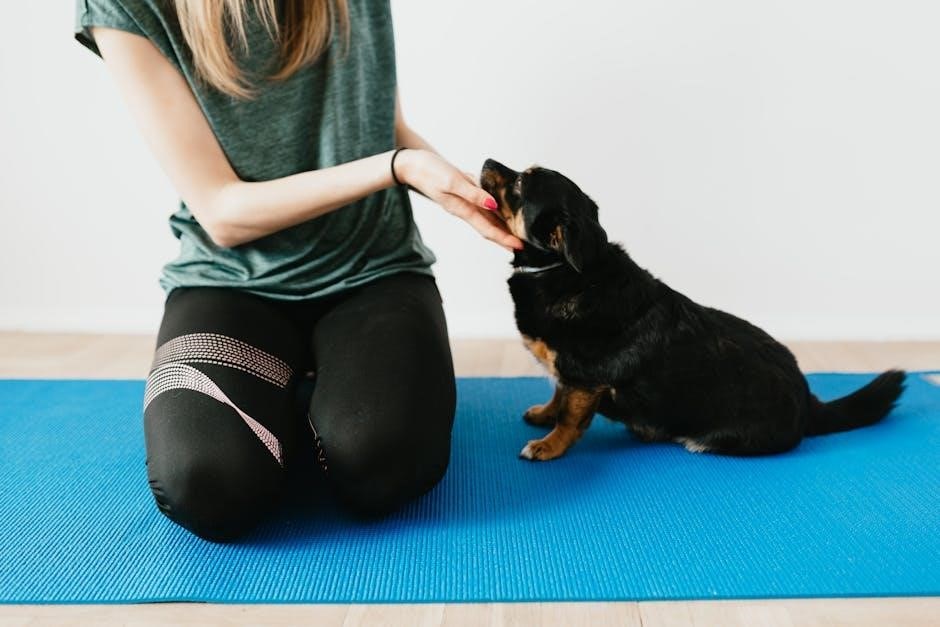
Mental and Physical Stimulation
Mental and physical stimulation are vital for puppies. Engage them with interactive play, exercise, and challenging toys to prevent boredom and stress, promoting overall development.
14.1 Importance of Playtime and Exercise
Playtime and exercise are crucial for puppies, fostering physical health and mental well-being. Regular activity helps burn energy, develop muscles, and prevent boredom-related issues like chewing or digging. Interactive play also stimulates their minds, reducing stress and destructive behavior. Exercise strengthens the bond between you and your puppy, promoting socialization and emotional growth. A tired puppy is a happier, healthier one, making playtime an essential part of daily routines.
14.2 Interactive Toys for Mental Stimulation
Interactive toys are essential for mental stimulation, preventing boredom and destructive behavior. Puzzle feeders, treat-dispensing toys, and durable chew toys challenge your puppy, keeping them engaged. Rotate toys regularly to maintain interest and reduce monotony. This effective approach ensures your puppy stays mentally sharp and satisfied, promoting overall well-being.
With patience and consistency, you’ll help your puppy grow into a well-behaved companion. Celebrate small victories, and remember, every effort shapes their future behavior positively.
15.1 Summary of Key Puppy Training Tips
Consistency, patience, and positive reinforcement are key to successful puppy training. Establish routines for potty breaks, feeding, and playtime to create a stable environment. Use crate training to aid housebreaking and reduce separation anxiety. Socialization is crucial for confidence and good behavior. Reward desired actions promptly and avoid harsh punishments. Celebrate progress, no matter how small, and remember, every interaction shapes your puppy’s future behavior.
15.2 Final Thoughts on Raising a Well-Behaved Puppy
Raising a well-behaved puppy is a journey of love, patience, and consistency. By focusing on positive reinforcement, clear boundaries, and ample socialization, you set your puppy up for a lifetime of confidence and good manners. Celebrate small victories, stay flexible, and cherish the bond you’re building. With time and effort, your puppy will grow into a thoughtful, loyal companion, enriching your life in countless ways.
Leave a Reply
You must be logged in to post a comment.